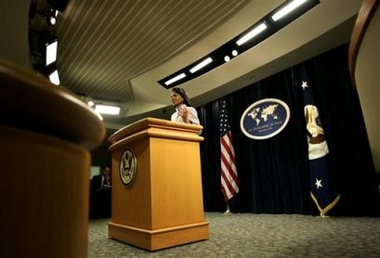|
Iran nuclear impasse could hurt US-India atomic deal
(Reuters)
Updated: 2006-01-14 10:37
A landmark U.S.-Indian nuclear cooperation deal could be hampered by India's
reluctance to refer Iran's nuclear program to the U.N. Security Council and to
open enough of its own atomic facilities to inspection, U.S. officials and
experts said on Friday.

U.S. Secretary of State addresses the United
States government's concern with the recent developments in Iran,
Thursday, Jan. 12, 2006, at the U.S. Department of State in Washington.
Rice, coordinating with European allies, called on the United Nations
Thursday to confront Iran's 'defiance' and demand that Tehran halt its
nuclear program. [AP] |
Both issues will be discussed when Undersecretary of State R. Nicholas Burns
visits New Delhi for talks on January 19.
Bush, in a controversial policy shift last July 18, promised nuclear-armed
India full cooperation in developing its civilian atomic power industry in
return for New Delhi's commitment to international nonproliferation standards.
The deal, which would lift a 30-year ban on nuclear commerce between the two
countries, must be approved by the U.S. Congress. The 45-nation Nuclear
Suppliers Groups is also being asked to change its rules.
India sided with the United States and major European powers when the U.N.
watchdog agency last September declared Iran had failed to comply with its
international obligations. The West accuses Iran of trying to develop nuclear
weapons, but Tehran says it wants nuclear technology to produce electricity.
The vote in the International Atomic Energy Agency came after U.S.
congressmen warned the U.S.-India agreement could be at risk if New Delhi did
not work with Washington to punish Tehran for nuclear-weapons related
activities.
When Iran this week raised the stakes by resuming nuclear fuel research,
western powers said they would take Iran to the U.N. Security Council, where
sanctions could be imposed.
They claim a majority of IAEA members will support referral but are keen for
yes votes from India and veto-wielding Security Council members Russia and
China.
The Indian Embassy in Washington and the State Department refused to
say if New Delhi would support this move.
But a U.S. official told Reuters India's position is "all up in the air" and
a European diplomat confirmed sending Iran to the Security Council "remains very
difficult for the Indians." Both sources are involved in the Iran diplomacy.
Despite vastly improving ties with Washington, India, a rising power with
voracious energy needs, is pursuing a U.S.-opposed gas pipeline project with
Iran and as leader of the Non-Aligned Movement has prized its independent
foreign policy.
After India voted with the Western powers in September, Indian officials
seemed to back off the decision in the face of domestic criticism.
"This is a key strategic decision for them. If they were to vote against U.N.
referral, I can't see there being any life left in the nuclear deal," the
European diplomat said.
A senior congressional aide added: "If India does anything but vote yes, it
could slow up the agreement significantly."
The other big issue involves the deal's centerpiece, India's promise to
separate military and civilian nuclear facilities and open civilian facilities
to IAEA inspection.
The plan is aimed at ensuring future U.S.-supplied nuclear fuel and reactors
do not advance India's weapons program.
President George W. Bush is to visit New Delhi by March and both sides hope a
separation plan could be settled by then.
India gave the United States a draft proposal last month but U.S. and
European officials said it fell short of the administration's
requirements.
|